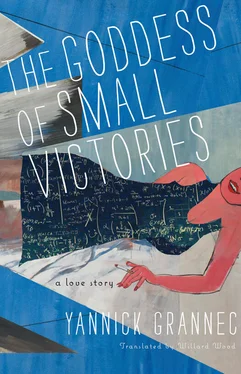“Here is my kleine Herr Warum , my little Mr. Why.”
“I would love to see a photograph of you as a child.”
“We left Vienna so quickly. When I came back after the war, everything had disappeared.”
“You must have been a very joyful girl!”
The old lady scratched her head under her turban. The edges had already discolored, the delicate blue shifting to a yellowish gray.
“I was the eldest of three Porkert sisters, Liesl, Elizabeth, and Adele — a terrible trio! What a racket we made! My father called me his ‘stubborn little mule.’ ”
Anna held back the comment on the tip of her tongue. She wasn’t sure whether she’d won back the right to be ironic.
“I was born at the wrong time. The girls today have all sorts of opportunities. We were so … imprisoned. Every freedom cost us so much. And also, we had experienced so many wars. We lived in fear of seeing our men go to the front. Even my husband. He had diplomas all over the place, and they still called him fit for service!”
“Did you immigrate to the United States so he wouldn’t be drafted?”
“We were waging battles on many fronts, my sweet.”
Anna went on to another snapshot. The kind word slipped by Adele into her sentence had affected her too strongly. She was not going to forget her humiliation because of a small trace of affection. She chose a tiny print in which Adele stood in a groom’s uniform against the backdrop of a theater curtain. She was holding hands with a man in blackface.
“The only remnant of my brilliant career as a dancer. It was hardly classical ballet. More like pantomime!”
“An era when people of color were not welcome in the theater.”
“The first time I ever saw a black man, I was getting off the boat in San Francisco in 1940. Even in Vienna’s nightclubs, I never met any.”
“Billie Holiday told the story that she was not considered black enough at first to sing jazz. She used to darken her face with makeup. Strange period.”
“Strange fruit. Ach! Billie … America was not all bad. When I arrived here, the music really helped me. Except for bebop, which I couldn’t stomach. What was that man’s name? Charlie Parker! He used to make me dizzy. Students were crazy about him. They compared his noise to Bach, to mathematics. I never saw the connection. In any case, Bach always made me feel depressed.”
“Did you go to nightclubs with your husband?”
“With Kurt! You are surely joking? He hated crowds and noise! No, I listened to singers on the radio. Ella, Sarah … I particularly liked Lady Day. Even if I didn’t understand all the words. Do you remember that song, ‘Easy to Remember but So Hard to Forget’?”
“Old photographs are probably not good for you, Adele.”
“I don’t look at them often. No point, I have it all here.”
Pushed by her finger, her turban came unstuck from the side of her head, and a rancid odor wafted into the room. Anna breathed through her mouth. The smell of Adele’s body mixed with the familiar smell of lavender troubled her. Her birthday present, a bottle of her grandmother’s favorite perfume, had been liberally applied. From her nostalgia, Anna realized it had been a mistake to choose the perfume of a departed loved one as a gift.
“That one, if I remember correctly, is from 1939, a little before we left.”
“You were terribly blond.”
“You have never dyed your hair. It’s not your style. Mein Gott! The pain I endured getting my hair dyed! It was the fashion. Look at those boobs! I was still trim in my forties! At that time, women my age were already in the garbage can.”
The Adele who looked out in black and white wore a dark-colored dress suit with muttonchop sleeves, a low neckline, and a skirt that was gored below the knees. Next to her, looking straight ahead, stood Kurt squarely, his raincoat open to reveal an impeccable suit.
“I had my old brolly tucked under my arm. Someday I’ll tell you about that umbrella.”
“You were looking away from the camera.”
“Adele the Egyptian, always in profile. Adele the invalid, always half a woman.”
Anna spread the photos over the bedspread. A lifetime appeared in relentless fast-forward: Adele put on weight; Kurt seemed to shrink inside his suits. They ended up looking like those pairs of birds whose name she couldn’t remember. She picked a snapshot at random. Against the backdrop of a ship’s rigging, Mr. Gödel stood like an old man, his back bent.
“Were you on the boat coming to the States?”
“I don’t like that picture, forget it. Look at this one of our wedding anniversary. We were having dinner at the Empire State Building.”
“You were dressed to the nines! Who took the photograph?”
“The local professional, probably. The one who harasses you with a big sales pitch. Thirty years later you are happy that you fell for it.”
“Nice hat!”
“I bought it on Madison Avenue. It was an extravagance; we were so hard up. But I made a scene. After ten years of housework, I had earned it.”
“You were happy.”
“This one is a wonderful souvenir. It was 1949, we had just moved into Linden Lane. Finally we had a real home!”
“It’s rare to see him smile like that.”
“Kurt was not expansive with his emotions.”
“You had a lot of courage. You lived an absolute life.”
“You’re very naïve! On the scale of a person’s life, the absolute is the consequence of many small renunciations.”
“I was in high school when my parents divorced. Renunciation was not in their career plans.”
Adele gathered the photographs and tried to put them in order, eventually giving up. She rested her hand on Anna’s thigh. “At a certain age, you must learn to pay the bill yourself, sweetheart.”
Anna got to her feet; Adele’s words had struck her with the force of a ruler, as though she’d been thwacked on the back to straighten her posture. In her low moments, Anna thought she would have preferred to be an unwanted child. She knew better, even wringing all the romanticism out of her family mythology. She had no cause for bitterness over that. She wasn’t the furtive offshoot of a tussle in the backseat of a Buick but the natural outcome of a sincere mutual affection. George, a smart-looking doctoral candidate, had met Rachel, the only scion of an old, well-to-do family, at a history department reception for new students at Princeton. The girl was shivering, the boy lent her his sweater. She had been impressed by his convertible and his Beacon Street accent. He had admired her Hollywood-goddess body and her still reasonable determination. He had telephoned her the next day. She presented him to her family. They had married, learned to hate their differences after originally loving them, betrayed each other first for the sport of it, then out of habit, and at last parted stormily. Anna was fourteen.
“Well within Gaussian norms,” said Leo, trying to comfort her when the divorce was announced. Pretentious metaphors came as profusely to the budding genius as the hairs on his chin were scarce. He’d started at an early age to draw up the bill he’d eventually present to his progenitors. Anna had little with which to reproach her own parents. They had hired competent governesses for her and sent her to unimpeachable schools. Her family had never endured a crisis that builds character and later gives you a history. No revelations of incest, no alcoholism or suicide. Her parents didn’t even suffer from a healthy middle-class neurosis. Disillusion wasn’t fashionable enough. They benefited in their thirties from the postwar economic boom and in their forties from the loosening of social mores. The ghosts of the Holocaust remained shut within the apartment of grandmother Josepha. She was alone in remembering the dead. If Josepha dared bring up the topic at the dinner table, the subject was quickly changed. Anna couldn’t blame her parents for dropping off their luggage at the baggage check. They had wanted to live.
Читать дальше












